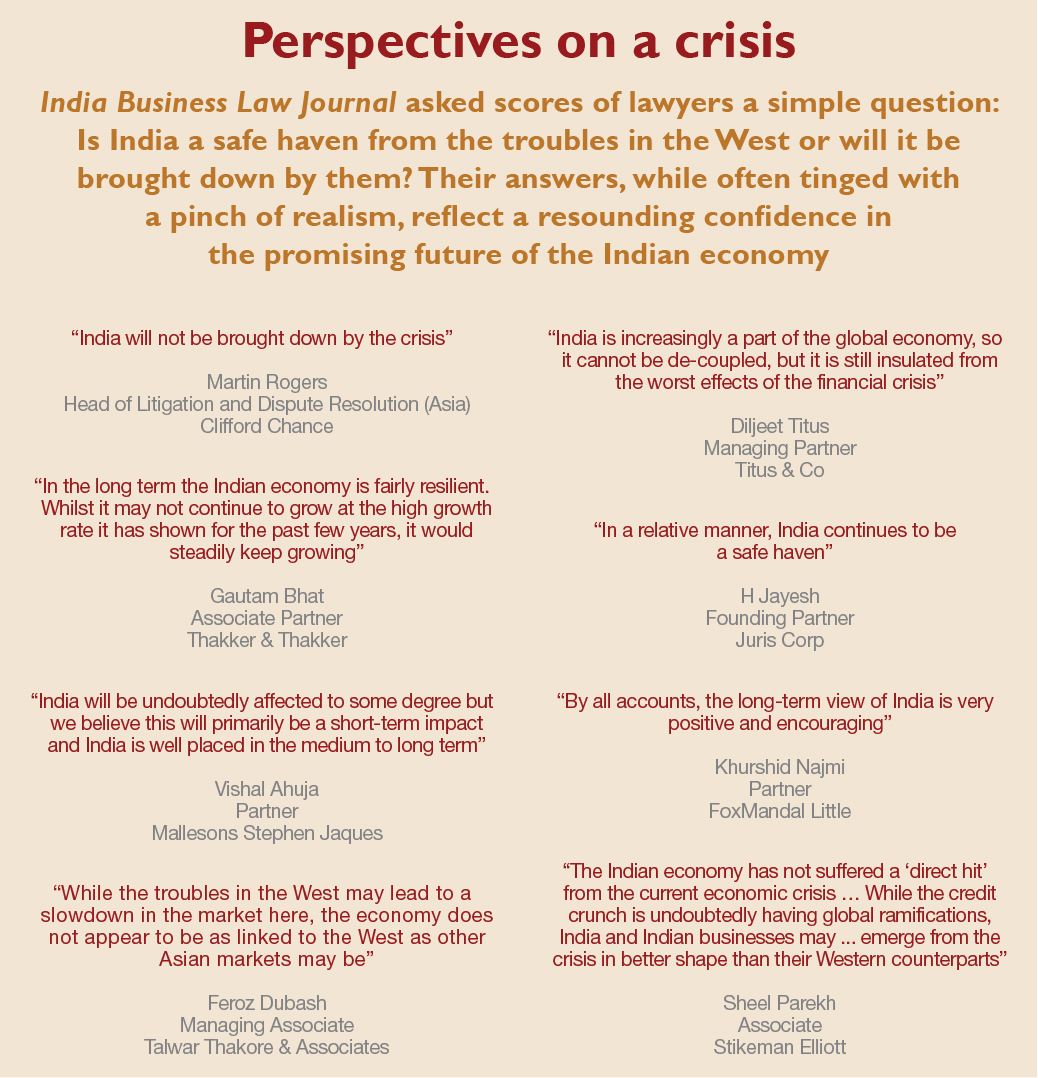How will the global financial flux affect India-focused businesses and law firms? Ben Frumin discovers that a mood of cautious optimism prevails among most experts
What began last year as a US slump sparked by bad mortgage debt has now become a wildfire ravaging many of the world’s strongest markets and proudest financial institutions. Governments are pumping gargantuan amounts of cash into their financial systems, credit markets spent most of October in a virtual freeze, many skittish investors are furiously selling their shares, and all too many markets, industries and institutions are tottering on the brink of collapse.
The Dow Jones Industrial Average has plummeted nearly 5,000 points, or 35%, this year. Japan’s Nikkei 225 has fared even worse. By 25 October, Russia’s RTSI index had lost more than three-fourths of its value this year. Trillions upon trillions of dollars of wealth have vanished. The world’s investors are in a panic.
India has been no exception. The Bombay Stock Exchange’s SENSEX index began 2008 above 20,000 points. It may be lucky to finish the year above 10,000 – “a bloodbath,” according to Juris Corp’s Huzefa Nasikwala.
Foreign institutional investors withdrew US$7 billion from Indian markets between January and August of this year, according to Ravi Kulkarni and Bhavik Narsana of Khaitan & Co. Another India-focused lawyer put the year-to-date figure at US$9 billion. Prominent Indian companies are laying off huge numbers of workers. Real estate values are tumbling.
“No one is safe from this crisis,” warns Chris Flosi of Barclays Capital.
“I don’t think we’ve hit rock bottom yet,” says Valerie Demont, a partner in Baker & McKenzie’s New York office, adding that “in our minds, we’ve kind of written 2009 off at this point.”
Yet, for lawyers and corporates focused on India, there may be reason for cautious optimism (see Perspectives on a crisis, page 18). While India’s economy has been negatively affected by the global financial crisis, it appears to be in a much better position than most to weather the storm.
“India is a very, very strong ship in the sea at a time when the sea is being buffeted by a very severe storm,” says Glenn Gerstell, managing partner in the Washington DC office of Milbank Tweed Hadley & McCloy. “But it’ll probably come out OK, and probably better than other ships.”
Rescued by conservative policies
In some ways, India is relatively safe from the fires that have torched many economies and financial institutions. Observers credit the strong fundamentals of the Indian economy for sparing India the worst of this global market meltdown.
“With absolute turmoil in the US financial markets, there’s some sense of things proceeding normally in the Indian financial markets,” says Gerstell. “The stock market’s down, but it hasn’t completely cratered.”
“Indian businessmen feel a lot more optimistic than their counterparts in the US do,” he adds.
The comparatively strict regulation of India’s banking and finance sectors – a target in recent years of some critics (“The regulatory environment in India has its fans and its foes,” says Reed Smith’s Gautam Bhattacharyya) – may also help shield India from the harshest blows of the financial crisis.
“As with the People’s Republic of China, I believe the relative lack of internationalization, to date, of Indian banks will tend to have the effect of insulating them from the credit crisis and the lack of confidence in the banking system,” explains Martin Rogers, head of litigation and dispute resolution in Asia for Clifford Chance.
“A slow and steady opening up of the Indian economy has helped in the long run,” notes Margaret D’Souza, a partner at Udwadia & Udeshi in Mumbai.
“India may not feel the entire brunt of the financial crisis,” she continues, “and this is on account of the fact that Indian banks and markets are regulated and to that extent, India is thankful to the intervention of the Left in the government’s policies.”
“India, despite liberalization, continues to be rather protected from any direct impact of meltdown of the financial institutions in the US,” says Khurshid Najmi, a partner in the banking and finance team at FoxMandal Little. “Thanks to the conservative attitude of the Reserve Bank of India in opening its financial sector, including a very cautious approach toward capital account liberalization, I do not expect any serious impact on the financial system as a whole.”
Despite such optimism, some believe that the world’s economies are too interconnected and interdependent for any one nation’s economy to be truly insulated.
“India is part of a very interconnected world,” argues Yusuf Safdari, senior counsel for Pillsbury Winthrop Shaw Pittman in Palo Alto. “Although the challenges for the Indian market may be different, no US market or Indian market is a safe haven in the short term.”
Gerstell agrees to some extent. “[India is] clearly going to be affected by this. And my guess is that the situation in the US economy is going to get worse before it gets better. It’ll probably persist throughout 2009. And it’s probably foolish to expect that it won’t have an effect on India.”
Lack of liquidity
One problem facing many businesses and investors in India is a lack of lending and leveraging opportunities. “In particular, Indian corporates have used leverage for a number of their international investments, and that leverage is currently unavailable or only rarely so,” explains Simon Hall, a partner with Slaughter and May in London.
This lack of financing has slowed what had increasingly been a torrent of deals between the US and India. “US and Indian banks have moved to tighten lending standards,” says Safdari. “One cannot help but think that the short-term impact of the financial crisis has been to pause or slow deal-making.”
“From the Indian side,” he adds, “the players are waiting to assess the situation once the dust settles in the US.”
Sectors that are dependent on the West for either financing or consumption may be in the most trouble. “Companies which were largely dependent on the US for revenues [and] business, such as software companies, would be worst affected,” says D’Souza.
“For obvious reasons, debt led by American and European – and to a lesser extent Asian – banks is very difficult, meaning that ‘ultra mega’ projects and the like are likely to be set back for a while, at least,” adds Hall.
Clinging to the scaffolding
Real estate and infrastructure are among the sectors in India most threatened by the financial crisis, according to several lawyers. Kulkarni and Narsana estimate that real estate prices have already plummeted 15-20% in the last three months alone. “The worst affected are real estate developers, for whom the chickens are truly coming home to roost,” said H Jayesh, founding partner of Juris Corp, a financial boutique law firm in Mumbai.
“There has been a clear tightening of the market in terms of real estate transactions,” agrees Jane Niven, regional general counsel and head of legal and compliance (Asia Pacific) for Jones Lang LaSalle. “In the short term there will be a slowdown in transactions and real estate values will come down. We have already seen rentals come off slightly, though landlords remain reluctant to decrease their prices.”
“The long-term problems,” Niven continues, “will be around infrastructure and the availability of quality commercial buildings. We have seen a number of high profile development projects being put on hold. The concern is that India already has a dearth of good quality properties and any downturn will necessarily reduce the stock further.”
“The big question for us is to see [whether] our infrastructure practice in India [will] continue to grow,” adds Gerstell. “It remains to be seen whether the global liquidity crisis and the difficulties banks are having will have a dampening effect in India.”
Unsurprisingly, capital markets have also taken it on the chin.
“It’s clear that the capital markets part of our business is definitely off,” says Gerstell. “Some deals are proceeding, but it’s at a slower rate. And the number of deals is down a lot. There’s no getting around that.”
Information technology may also be adversely affected.
“The big losers in the global financial crisis in India will be giant software firms like Infosys, Wipro and TCS, as most of their revenues came from the erstwhile giant banks and that could affect their profitability in the short term,” say Kulkarni and Narsana.
Sheel Parekh of Stikeman Elliott seconds that, but offers a note of optimism. “It is possible that the IT industry in India may see a near-term slowdown in terms of new business from Western financial institutions,” Parekh says. “However, with IT being so intricately woven into the processes and procedures of most corporations around the world, it is entirely possible that many businesses (including those involved in financial services) will continue to spend money to maintain their current IT systems.”
Opportunity in the face of adversity
Victims of the financial meltdown are turning to Indian legal specialists for critical advice on restructuring, litigation and crisis management
Not only do many India-focused lawyers say they’ve been relatively unaffected by the financial crisis, some say their practices are actually growing as a result of it. Diljeet Titus of Titus & Co, for instance, says his practice “continues to grow, and profits [have] increased by 25% over last year”.
He’s not the only one. Many lawyers say they’ve seen a marked increase in India-related work. “Way more work than usual,” says Chris Flosi of Barclays Capital, “including lots of close-outs and restructurings.”
“In the short term we have seen an upturn in litigation work related to India, particularly between corporates and banks in respect of structured currency hedging contracts where the corporates have incurred heavy losses in the recent past and are now seeking to avoid large liabilities,” says Martin Rogers at Clifford Chance. “As international counsel, we cannot be directly involved in this, but we can provide offshore support and coordination between the banks and local Indian law firms handling the litigation.”
Titus says there’s also been an increase at his firm in document reviews arising from crisis-related litigation. “Assistance in internal and regulatory investigations will be in demand during and after the crisis,” he says. “In the ongoing crisis, financial institutions are hurrying up due diligence exercises for outstanding liabilities, which involve professional services of lawyers.”
Part of the decision to consult Indian lawyers is naturally the result of price consciousness. “During this slowdown, there is tremendous pressure on in-house counsels, and in turn on their law firms, to reduce costs of legal services by outsourcing to LPOs in India,” explains Titus.
“The LPO firms in the country are gearing up their risk-assessment teams in anticipation of a surge in jobs related to the scrutinizing of clients’ financial transactions and corporate governance,” say Ravi Kulkarni and Bhavik Narsana of Khaitan & Co. “There would also be pressure on in-house counsel departments, and in turn their law firms, to reduce the costs of legal services by outsourcing to LPOs in India where that fee can be as low as 10% of the top US law firms.”
Feroz Dubash of Talwar Thakore & Associates predicts that law firms will also be presented with opportunities to assist with debt restructurings. Vandana Sekhri, a partner at Juris Corp, agrees with this forecast and believes that “dispute resolution, restructuring and distressed asset work will increase significantly.”
Transactional lull
Still, many India-focused firms say their practices have taken a small hit as a result of the lull on the deal front.
“The interest in India is not reduced, as is apparent from the number of queries that we receive, but the actual flow of work has taken a slight dip,” says Khurshid Najmi of FoxMandal Little. “India investment-related teams both in local and foreign law firms are not yet shrinking, but they are less busy now.”
“New works are being generated, but the pace is slow,” Najmi continues. “There are delays in clearance of bills by both foreign and local clients. The current situation is likely to continue in the short term.”
Dubash paints a similar picture. “Several of our transactions have been put on hold, and we anticipate they will remain on hold for a number of days,” he says. “New transactions may take a little longer to appear.”
“Several large ongoing transactions have been put on hold and there are [fewer] transactions,” agrees Margaret D’Souza, a partner at Udwadia & Udeshi in Mumbai. “On the other hand, compliance-related work has increased.”
H Jayesh, Juris Corp’s founding partner, puts it this way: “The advisory element of the work has actually increased while the transactional element has significantly decreased.” While the workload has not been too overwhelming, Jayesh explains that “given the trickle of defaults – expected to become a torrent if not a flood – by corporates and crash in valuations [equity and real estate], we are being kept busy by dispute resolution and restructuring work.”
Constriction fears
While there may be small downturns or changes in the focus of work at some Indian law firms, many believe India practices at international firms are more vulnerable to the negative impact of the global financial crisis.
One reason for this, says Eliab Erulkar of Baker & McKenzie, is the tendency towards the hyper-specialization of lawyers in the West; a practice which fundamentally distinguishes international firms from Indian law firms.
“I expect that when there’s a downturn in the banking market, lawyers who do banking work can just do other types of work [in India],” Erulkar says. But for Western lawyers with a niche focus on an Indian sector hit hard by the economic crisis, “there’ll be a lot of old dogs learning new tricks pretty soon”.
Valerie Demont of Baker & McKenzie in New York believes that most Indian lawyers won’t see a slowdown because of the financial crisis. “So far they seem to be as busy as ever,” she says, adding that already “they had more work than they could handle.”
Gautam Bhat of Thakker & Thakker suggests that if the economic crisis forces Western law firms to shrink their domestic work, these international firms might become more aggressive in targeting less-affected markets like India. Like many other lawyers, Bhat says Indian law firms will be less affected by the financial tumult than their international counterparts.
“Whilst some of our practice groups, like capital markets, have been affected, for many of the others it is, so far, business as usual,” he says.
Sakate Khaitan of ALMT Legal in London admits that some practice areas – such as structured products and investment funds – “have seen a mere trickle of work or none at all”. However, he adds, “we have not as yet heard of India teams contracting.”
Sunny Handa of Blake Cassels & Graydon in Canada suggests that panicky talk of downscaling a firm’s India practice group just because a firm is no longer landing multibillion-dollar deals that require the sort of financing that’s no longer readily available, is premature and unnecessary.
“You can always recast yourself and do smaller deals for a little while,” he remarks. “There’s going to be less money sloshing around the system. But that doesn’t mean you pack up your tent and go home. It just means you reallocate resources into smaller deals, continue to do the commercial work and hang in there.
“There’s no doubt in my mind that it’s going to bounce back,” says Handa confidently.
**
Outsourcing: the silver lining?
As an important member of the global economy, India’s capacity to shelter itself from the tempestuous financial storm is limited. Nevertheless, amid this crisis, many see opportunity.
“There is undoubtedly a big opportunity for India,” says Vishal Ahuja of Mallesons Stephens Jaques. “It is financially stable and should therefore be able to continue a high rate of economic growth, certainly in comparison to the West.”
Diljeet Titus of Titus & Co says the outsourcing sector is already “witnessing a positive effect of the US financial crisis” in which many leading corporate houses and investment banks are shifting their credit crisis-related work to lawyers in India (see Opportunity in the face of adversity, page 20). “It is a more viable and cost-effective option,” Titus says, adding that the legal process outsourcing (LPO) sector is also “expected to witness a surge in business”.
Others aren’t so sure that Western entities hit hard by the financial turmoil have the time or luxury to cut costs by shifting operations to India. “Companies are too involved in saving themselves and management does not, at the moment, have the time to consider cost-cutting measures,” says Sakate Khaitan, a partner with ALMT Legal in London. “However, in the medium to long term, the crisis should benefit India, given its reputation as a low-cost quality destination for provision of services and inherent ability to grow.”
“It would seem that this may benefit outsourcing in the long term,” agrees Feroz Dubash, managing associate for Talwar, Thakore & Associates in Mumbai. “But again, in the short term it is likely to have a negative impact as firms wait and see.”
Some lawyers believe that even though the financial crisis will result in an obvious increased focus on off-shoring centres like India, the world’s largest democracy will still take a hit. “A general global economic slowdown may hurt India more than any marginal up-tick in off-shoring activity,” Flosi says.
It’s also worth noting, several lawyers say, that a significant proportion of India’s outsourcing sector has historically consisted of the sort of companies that are contracting, being bought, or going bankrupt.
“[Some] outsourcing firms are having a slump given that their key revenues came from the US banking and financial services sector,” D’Souza says.
Those who have already witnessed an upsurge in related activity, however, argue otherwise. “There is a very real prospect that further outsourcing to India will occur,” says Niven. “We have seen an increase in requests for information about the services Jones Lang LaSalle provides to outsource facilities like call centres and R&D facilities.”
A caveat to the potential outsourcing opportunities indirectly created by the financial crisis is an issue that persisted long before the global economy imploded. “With rising wages among certain types of Indian workers, particularly IT workers, this catalyst may have seen its zenith in the previous down market in the West,” says Safdari, noting that “for markets that have not matured, India could certainly benefit from the West’s turbulence.”
Demont expects a big shakeup in the outsourcing sector. Her vision of the future of outsourcing is one with fewer clients, fewer providers, but increased work – highlighted by a consolidation of the back-end banking and financing businesses that have been a key segment of India’s outsourcing sector.
“Their needs are going to go up because of the pressures internally to cut costs,” she argues, adding that “the outsourcing model is really proven to work.”
Shopping spree for India’s big spenders
Another potential opportunity created for Indian entities by the recent financial plunge lies in the cash-rich position of a number of Indian business groups. “Those companies recognize that for further growth, or for strategic reasons, they need to look beyond India,” says Gerstell. “Falling prices around the world are only going to make that a more attractive option for those companies.”
Demont agrees, saying the financial crisis in the US creates a number of investment opportunities for Indian companies.
“Indian companies have a lot of cash,” she says. “They have a lot of leverage. I expect them to be major players in the US market, because cash is king these days.”
That’s a refrain being repeated by a number of lawyers, almost as if it were a reassuring mantra. “In this market, cash is king,” says Sunny Handa, co-head of the information technology group and India practice group for Blake Cassels & Graydon. “There’s no question. If you’ve got cash, you’re the king.”
Of course, there’s a danger to being royalty. Indian entities that try to snatch international bargains too early, before prices have truly hit rock bottom, may end up paying too high a price. Also, Gerstell advises, Indian buyers shouldn’t rush towards a fire sale in the US and snap up assets unless it makes strategic sense for them to do so.
“The mere fact that there’s a ‘For Sale’ sign hung on something doesn’t mean someone should go in and buy it,” he says.
Domestic demand remains healthy
The US isn’t alone in offering investors a chance to benefit from plunging valuations. Ripe opportunities still exist for foreign investors in search of lucrative bargains in India itself.
“There are still substantial investment opportunities in the Indian market,” says Bob Nelson, a partner with soon-to-be-dissolved US law firm Thelen. “A number of firms [are] greatly in need of private equity injections since Indian interest rates have skyrocketed and credit availability has lessened.”
Even sectors of Indian business that have been hit hardest by the financial crisis may double as tantalizing opportunities for some investors. India’s slumping real estate market is one such example.
“Global and India-targeted real estate funds coming into India now are finding excellent long-term buying prospects since the white-hot market of the last few years has cooled off and experienced a substantial correction,” explains Nelson. “Because so many of the real estate development companies have overextended themselves, and are unavailable to obtain sufficient credit at reasonable prices, they either need to put themselves or some of their crown jewel assets up for sale.”
According to Nelson, for investors, especially those using pension funds and other forms of financing with a more long-term focus, now is the prime time to pick up excellent assets either relatively cheaply, or at least for more reasonable prices than have been seen for a while.
Meanwhile, many lawyers also argue that the fundamentals of the Indian economy that have and will continue to fuel the country’s massive growth, shouldn’t be ignored, regardless of the season’s financial downturn.
India’s middle class is still growing, construction continues, and consumer demand remains on the rise, says Handa. India’s ballooning middle class wants houses, apartments, cars, food and any number of consumer goods. “The purchasing power in that country is massive,” he adds. “There are some things that don’t change.”
“Domestic demand should continue as there is little reliance on export activity, it has good foreign reserves and high domestic savings rates,” says Ahuja. “Some also believe that India is even better placed to ride out the storm than China, which has greater export reliance.”
Although certain industries have experienced sharp blows, a “blessing in disguise” may come in the form of stemming inflationary pressures, Safdari says.
“In some ways, the Indian economy may have been overheating in certain sectors,” he remarks. “In other words, though the short-term impact may be to blunt growth, Indian growth should proceed at a good pace for the long term and perhaps avoid overheating.”
“In the medium to long term, our view is that India should prove to be a safe haven, particularly due to its demographics and inherent ability to grow exponentially,” says Khaitan.
“However, in order to harness such latent prowess, there needs to be political will and general public support for change in certain fundamental laws that are inhibiting India’s growth story … In addition … there is an urgent need to increase the number of judges and speed up the process of dispute resolution.”
Fingers crossed
While a mood of cautious optimism prevails, there seems to be a clear consensus that India, its lawyers, its markets, and its business enterprises will be affected by the global financial crisis to some degree. What’s unclear is just how destructive that effect will be.
Many India-focused lawyers believe that any harmful effects experienced by India and other emerging markets will be considerably less than the negative consequences faced by leading Western economies.
“The emerging markets have a growth trajectory that will be hampered a little by this, but I think there’s still so much room to grow in these markets,” says Gerstell. “And of the emerging markets, India is probably in one of the best if not the best position.”
“We’re probably in for some tough times globally in the next 18 months,” Gerstell admits. “But India should be in a disproportionately good position through all of this.”
What’s important, several lawyers say, is putting into context any severe repercussions that may be faced by the Indian economy.
“We’re talking about growth rates dropping from 12% or some crazy number to eight or seven or six,” says Gerstell. “It’s still a vibrant, robust economy. And there’s still a lot of opportunity for law firms.”
“I’d rather be involved with the India practice right now than the capital markets practice for Merrill Lynch,” quips Demont. “This is one bright spot in the global market.”


































